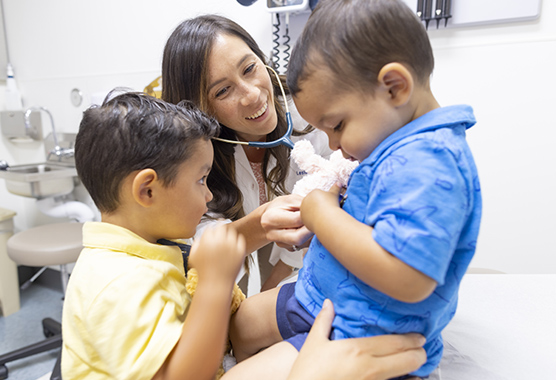Acquired Heart Conditions in Children
Children can develop heart conditions at any point from infancy till adulthood. These are called acquired heart disorders.
Medically reviewed by Jonathan Gil Dayan, M.D. on March 08, 2024.

Care and Treatment for Pediatric Acquired Heart Conditions
Early detection and prompt treatment are important for children with acquired heart conditions. At the UC Davis Pediatric Heart Center, we provide advanced therapies for children of all ages.
Types of Acquired Heart Conditions
An acquired heart condition is any heart disorder that wasn’t present at birth. These conditions are different than congenital heart defects, which are conditions that a child is born with.
If your child develops an acquired heart disorder, our experts are here to help. At the UC Davis Pediatric Heart Center, we provide the specialized care your child needs.
There are several types of acquired heart conditions. Our pediatric cardiologists are experts at diagnosing and treating all acquired heart disorders in children, including:
- Cardiomyopathy: This disease causes a dysfunction of the muscles of the heart. There are different types, including dilated cardiomyopathy, hypertrophic cardiomyopathy, arrhythmogenic right ventricular cardiomyopathy, non-compaction cardiomyopathy, and restrictive cardiomyopathy.
- Kawasaki disease: This is the most common type of acquired heart disease. It causes the coronary arteries to swell, limiting their ability to supply oxygen to the heart.
- Myocarditis: This causes inflammation of the heart muscle that can damage the organ.
- Rheumatic heart disease: This stems from rheumatic fever and can damage the heart’s valves.
Symptoms of Acquired Heart Conditions
Since there are many different types of pediatric acquired heart disease, symptoms can vary widely. Your child may experience no symptoms or ones that are severe enough to require immediate treatment.
Common Symptoms
Talk to your pediatrician if your child experiences any of the possible signs of an acquired heart condition, including:
- Dizziness
- Fatigue
- Irregular heart rhythm
- Joint pain or swelling
- Poor circulation (cold hands and feet)
- Swelling of hands, feet or abdomen
Emergency Symptoms
Seek immediate medical help if your child experiences signs of a serious heart problem, such as:
- Blue or grayish skin color
- Chest pain
- Fainting
- Shortness of breath
Causes of Acquired Heart Conditions
A variety of factors can lead to a child developing a heart condition. These include:
Genetics
Some acquired heart conditions can be inherited. If you have a family history of inherited heart conditions, talk to your child’s pediatrician.
Infections
Certain bacterial and viral infections can lead to acquired heart disease in children.
Structural Defects
If your child is born with heart valve issues or other structural heart problems, they may be at higher risk of developing an acquired heart condition.
Diagnosing Acquired Heart Conditions
Acquired heart conditions present themselves in many different ways. Some symptoms can easily be mistaken for non-heart-related conditions. That’s why it’s important to seek out a pediatric cardiologist with the expertise to make an accurate diagnosis.
Diagnosis may start with a physical exam and blood tests. If your child’s physician suspects a heart condition, they will order more tests, which could include:
- Cardiac MRI: Helps us see detailed images of the heart muscle and tissue
- Chest X-ray: Provides pictures of the heart structure
- Echocardiogram: Tests the heart’s structure and function
- Electrocardiogram (ECG): Analyzes the heart’s electrical activity
Treatments for Acquired Heart Conditions in Children
If your child needs treatment for an acquired heart condition, our pediatric cardiologists work with you to find the most effective therapies.
At the UC Davis Pediatric Heart Center, we offer exceptional care for infants, children and teens. Whether your child needs acute care or long-term treatment, our team can help. We provide the support your family needs while we bring your child back to their best health.
Depending on their condition, your child may receive:
Medication
We use medication as a first course of treatment for many acquired heart conditions. In some cases, medication — for the short- or long-term — may be all your child needs to keep their heart healthy.
Implantable Devices
Some acquired heart conditions can cause an arrhythmia (irregular heart rate). A pacemaker or implantable defibrillator can help restore normal heart rhythms.
Surgery
Heart surgery may be necessary to fix certain acquired heart conditions. If your child needs surgery, our pediatric cardiovascular surgeons have the expertise necessary to perform these complex procedures safely. After surgery, your child will spend time recovering in our pediatric and cardiac intensive care unit (PICU).
Request an Appointment
As Sacramento's No. 1 hospital, you'll benefit from unique advantages in primary care and specialty care. This includes prevention, diagnosis and treatment options from experts in 150 specialties.
Referring Physicians
To refer a patient, submit an electronic referral form or call.
800-4-UCDAVIS
Patients
Call to make an appointment.
Consumer Resource Center
800-2-UCDAVIS

Ranked among the nation’s best hospitals
A U.S. News & World Report best hospital in cardiology, heart & vascular surgery, diabetes & endocrinology, ENT, geriatrics, neurology & neurosurgery, and pulmonology & lung surgery.

Ranked among the nation’s best children’s hospitals
U.S. News & World Report ranked UC Davis Children’s Hospital among the best in pediatric nephrology, orthopedics*, and pulmonology & lung surgery. (*Together with Shriners Children’s Northern California)

Ranked Sacramento’s #1 hospital
Ranked Sacramento’s #1 hospital by U.S. News, and high-performing in aortic valve surgery, back surgery (spinal fusion), COPD, colon cancer surgery, diabetes, gynecological cancer surgery, heart arrhythmia, heart failure, kidney failure, leukemia, lymphoma & myeloma, lung cancer surgery, pacemaker implantation, pneumonia, prostate cancer surgery, stroke, TAVR, cancer, orthopedics, gastroenterology & GI surgery, and urology.

The nation’s highest nursing honor
UC Davis Medical Center has received Magnet® recognition, the nation’s highest honor for nursing excellence.

World-class cancer care
One of ~59 U.S. cancer centers designated “comprehensive” by the National Cancer Institute.

A leader in health care equality
For the 13th consecutive year, UC Davis Medical Center has been recognized as an LGBTQ+ Healthcare Equality Leader by the educational arm of America’s largest civil rights organization.

